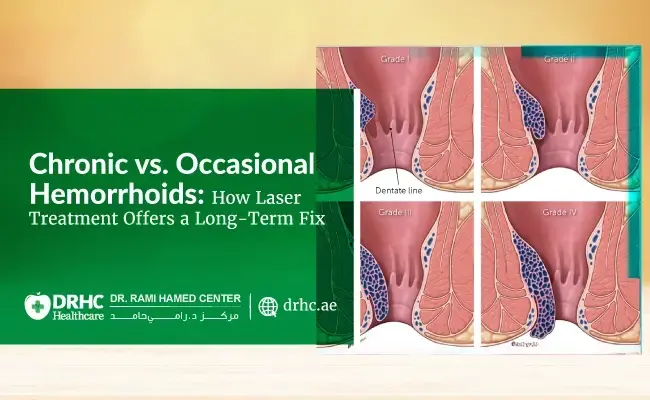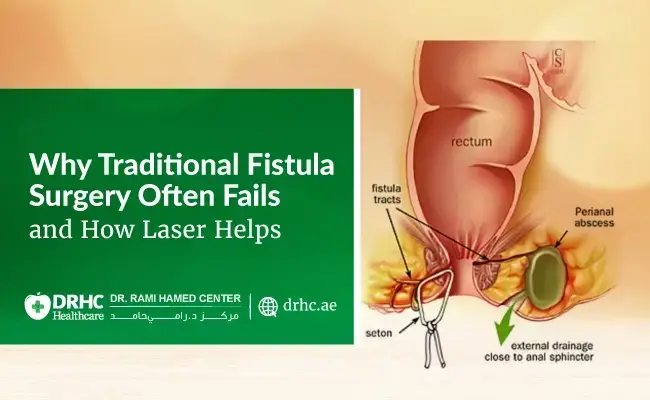
Hearing the word “hernia” can feel worrying—especially when surgery is mentioned. Many patients at DRHC Dubai ask if there’s a way to treat a hernia without undergoing an operation. It’s a valid question, and the good news is: that you’re not alone in wondering.
This blog post aims to explain the truth about hernias, address common myths, and help you understand when surgery is truly necessary—and when it might not be. Our goal is to provide reassurance, clarity, and guidance, so you can feel confident in your care journey.
What Is a Hernia?
A hernia happens when part of an organ (often the intestines) pushes through a weak spot in the surrounding muscles or tissue. This can result in a visible bulge, discomfort, or even pain—especially when coughing, bending, or lifting.
The most common types of hernias include:
- Inguinal Hernia (groin area)
- Umbilical Hernia (belly button)
- Hiatal Hernia (upper stomach into chest)
- Incisional Hernia (post-surgical scar area)
Can a Hernia Go Away on Its Own?
Unfortunately, no. Hernias do not heal by themselves. Once the muscle or tissue wall has weakened and the hernia has formed, the only permanent solution is surgical repair.
Some small hernias may not worsen immediately, and in certain low-risk cases, doctors may recommend watchful waiting—but this is only a temporary approach and must be carefully monitored.
Common Myths About Hernia Treatment
Myth 1: You Can “Push It Back In” and It’ll Be Fine
Reality: While you might be able to temporarily reduce the bulge, this does not fix the hernia. The opening in the muscle remains, and the hernia will return—often becoming larger or more painful over time.
Myth 2: Hernia Belts Can Cure It
Reality: A hernia belt or truss may offer short-term relief but does not repair the tissue defect. Prolonged use without medical supervision can sometimes lead to complications like skin irritation or worsening of the hernia.
Myth 3: If It’s Not Painful, It Doesn’t Need Treatment
Reality: Not all hernias cause pain, but they can still be dangerous. A painless hernia can suddenly become strangulated, meaning the blood supply to the trapped tissue is cut off. This is a medical emergency and requires immediate surgery.
What Can Help—Short-Term Strategies
While non-surgical methods cannot fix a hernia, certain lifestyle measures may help manage symptoms and slow progression:
- Maintain a healthy weight to reduce pressure on the abdominal wall
- Avoid heavy lifting or straining
- Eat a high-fiber diet to prevent constipation and straining
- Treat persistent coughs or respiratory conditions
- For hiatal hernias, avoid heavy meals, elevate your head when sleeping, and limit acidic or spicy foods
Remember, these are supportive measures, not cures.
When Is Surgery the Right Option?
Hernia surgery is typically recommended when:
- The hernia is growing or causing pain
- It interferes with daily life or physical activity
- There's a risk of incarceration (trapped tissue) or strangulation
- You want a long-term solution and peace of mind
At DRHC Dubai, we offer both open and laparoscopic (keyhole) hernia repair, depending on the type and size of the hernia, your overall health, and your lifestyle needs.
Minimally invasive surgery often means:
- Smaller incisions
- Faster recovery
- Less post-operative pain
- Shorter hospital stays (many patients go home the same day)
Our Related Blogs:
- How VAAFT Reduces Recurrence in Complex Anal Fistulas
- What Makes VAAFT a Sphincter-Saving Procedure?
- Step-by-Step Guide: What to Expect During Laser FiLaC Fistula Surgery
- FiLaC vs. Traditional Fistula Surgery: A Gentle Approach to Healing
- Is Bariatric Surgery Right for You? Everything You Need to Know
- Types of Weight Loss Surgeries: Gastric Sleeve, Bypass, and More
- What to Expect After Bariatric Surgery: Recovery, Diet, and Results
- Can Bariatric Surgery Help Reverse Type 2 Diabetes?
FAQs About Hernia Surgery at DRHC Dubai
Will it be painful?
Mild discomfort is normal after surgery, but pain is typically well managed with medication. Most patients are up and walking on the same day.
How long is recovery?
Recovery time depends on the type of surgery and the individual. Most people return to light activity in 1–2 weeks and full activity in 4–6 weeks.
Are there risks?
As with any procedure, there are risks, but hernia repair is generally very safe—especially when performed by experienced surgeons using advanced techniques, like those available at DRHC Dubai.
Compassionate Care at DRHC Dubai
We understand that the thought of surgery can be overwhelming. That’s why we take time to explain your options, answer all your questions, and provide a personalized treatment plan that respects your concerns and health goals.
Whether you’re looking for a second opinion, exploring surgery options, or simply trying to better understand your condition, our team at DRHC Dubai is here to support you—every step of the way.
Book a Hernia Consultation Today
If you or a loved one is living with a hernia, don’t wait for it to get worse. Early evaluation can prevent complications and provide peace of mind.
Contact DRHC Dubai today to schedule a consultation with our general surgery team.
📞 Call Us: +97142798200
📍 Visit Us: Dr Rami Hamed Center, Dubai HealthcareCity
🌐 Website: www.drhc.ae
Topic: General Surgery hernia surgery




.webp)



Leave a comment